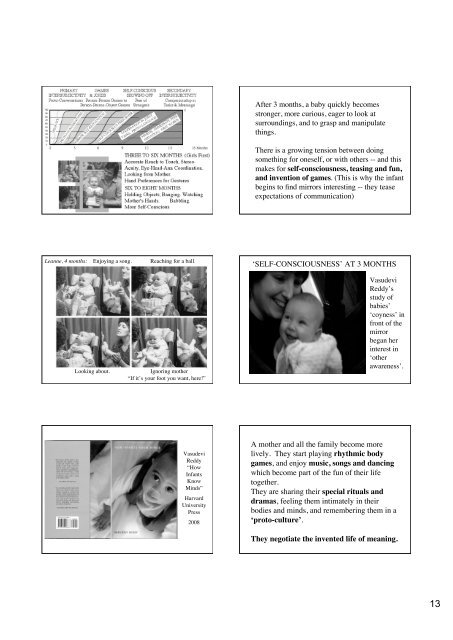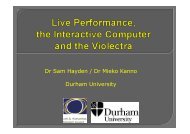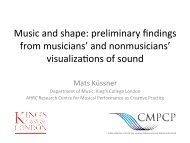Presentation: PPT file, 16Mb - AHRC Research Centre for Musical ...
Presentation: PPT file, 16Mb - AHRC Research Centre for Musical ...
Presentation: PPT file, 16Mb - AHRC Research Centre for Musical ...
Create successful ePaper yourself
Turn your PDF publications into a flip-book with our unique Google optimized e-Paper software.
Leanne, 4 months: Enjoying a song. Reaching <strong>for</strong> a ball.<br />
Looking about. Ignoring mother<br />
“If it’s your foot you want, here!”<br />
Vasudevi<br />
Reddy<br />
“How<br />
Infants<br />
Know<br />
Minds”<br />
Harvard<br />
University<br />
Press<br />
2008<br />
After 3 months, a baby quickly becomes<br />
stronger, more curious, eager to look at<br />
surroundings, and to grasp and manipulate<br />
things.<br />
There is a growing tension between doing<br />
something <strong>for</strong> oneself, or with others -- and this<br />
makes <strong>for</strong> self-consciousness, teasing and fun,<br />
and invention of games. (This is why the infant<br />
begins to find mirrors interesting -- they tease<br />
expectations of communication)<br />
‘SELF-CONSCIOUSNESS’ AT 3 MONTHS<br />
Vasudevi<br />
Reddy’s<br />
study of<br />
babies’<br />
‘coyness’ in<br />
front of the<br />
mirror<br />
began her<br />
interest in<br />
‘other<br />
awareness’.<br />
A mother and all the family become more<br />
lively. They start playing rhythmic body<br />
games, and enjoy music, songs and dancing<br />
which become part of the fun of their life<br />
together.<br />
They are sharing their special rituals and<br />
dramas, feeling them intimately in their<br />
bodies and minds, and remembering them in a<br />
‘proto-culture’.<br />
They negotiate the invented life of meaning.<br />
13




